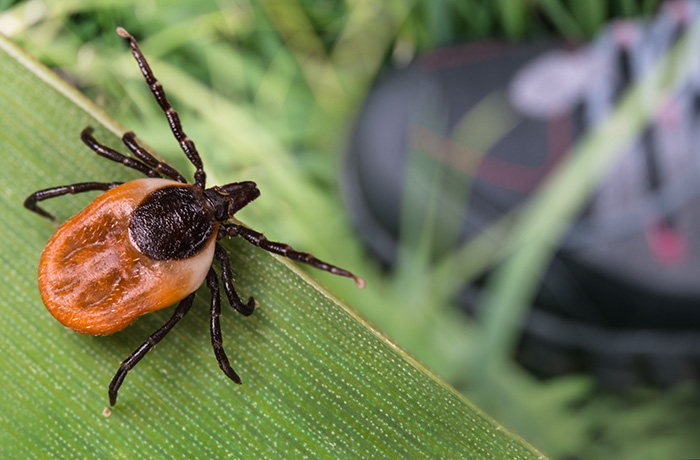
When you take advantage of warm summer days by enjoying a hike through the woods or a picnic in the park, make sure you’re protecting yourself and your pets from a tiny, almost invisible threat: ticks.
Ticks hide in wooded and grassy areas across the state and can spread serious diseases through their bite. It’s important to know about the dangers of tick-borne diseases and learn how to protect yourself, your loved ones and your furry friends.
Tick-borne disease.
While ticks can spread several diseases, the most commonly known tick-borne disease in the United States is Lyme disease. If an infected tick attaches itself for 36 to 48 hours, then the bitten pet or human can contract Lyme disease. This illness is usually spread through blacklegged ticks during the year's warmer months.
In Ottawa County, historical data, as well as data from the CDC, show that cases of Lyme disease increase around April, May and through the summer.
Know the symptoms.
It’s important to familiarize yourself with the wide-ranging symptoms of Lyme disease. Seek medical attention if you are bitten by a tick and develop the following symptoms:
- Flu-like symptoms
- Heart problems
- Neurological symptoms
- Skin rash
- Headache
- Fatigue
- Paralysis or weakness in muscles or joints
Symptoms can progress for years after being bitten and the infection can spread to your nervous system, heart and joints. In most cases, the disease can be successfully treated within a few weeks through prescribed antibiotics.
Prevent tick bites.
These are the best ways to protect yourself, your loved ones and your pets from ticks:
- Wear insect repellent.
- Avoid areas with high grass or brush.
- When hiking, stay on the trails.
- Keep your yard clear of leaves, tall grasses and brush. Consider using a pesticide.
- Check your clothing and body for ticks after outdoor activities in grassy or wooded areas. Bathe or shower within two hours.
- Wash clothing in hot water and dry on high heat.
To protect your pets from ticks, talk to your veterinarian about tick prevention products and thoroughly check your pets for ticks after outdoor activities.
If you find a tick on yourself or your pet, use tweezers to pull it off without twisting or jerking. Clean the area with soap and water or rubbing alcohol.
Keep enjoying the outdoors.
Don’t let a fear of ticks keep you from spending warm summer days outdoors. If you’re informed and taking the recommended precautions, you can successfully reduce the risk of tick-borne illnesses for you and your pet.
If you are concerned about a potential tick bite or you are experiencing the symptoms of Lyme disease, contact your primary care provider. If you need an appointment and your provider isn’t available, try our Holland Hospital Walk-In Care in Zeeland.